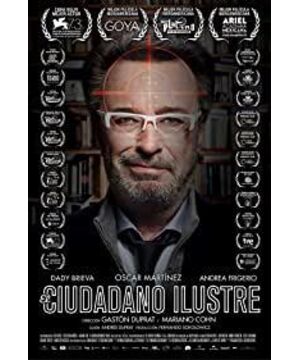The film "El Ciudadano Ilustre" co-produced by Argentina and Spain has a simple and simple style. With the continuous emergence and development of dramatic conflicts, the story is effectively promoted and shaped. The protagonist and the interesting group portraits are all ridiculed and absurd, ironic and self-deprecating, ridiculous and distorted.
Javier Dolan sang the lyrics of the song quoted in his film "Just the End of the World": "Home is not a harbor, it is a place where my scars are scarred." This sentence seems to be extended to my homeland-my hometown is not a harbor, yes The place that scarred me. For some wanderers, especially those who have pursuits and ideas, hometown is not a place where people verbally chant love and miss, there is a stale, stagnant and depressive taste, as if there is a long-lasting The "evil old forces" are waiting for you to return to your hometown, so that you can "swallow you alive" and "kill them all". The parts that once made you feel physically and mentally uncomfortable not only still exist, but also because of your current status. Changes have made things worse, not to mention that time and space have widened the gap in mutual awareness, so going back often gives people a lingering sense of powerlessness and helplessness, so more and more people are cowardly in their hometowns. At this level, the narrow hometown shown in "Outstanding Citizen" has a sense of borderlessness.
The film seems to show the second strangulation of a writer by the hometown in a gradual and orderly manner. With an irresistible brutal force, the hometown is carrying out all aspects of "kidnapping", persecuting, crushing and strangling the writer, and finally even has his life. Worry, in fact, this is a journey of heart and brain stimulation for the black-bellied writer, because he desperately needs such a trip.
When he won the Nobel Prize in Literature, the writer confessed that this is not a good thing for an artist, and this may ruin his creative career. This is reminiscent of an elderly Doris Lessing who met reporters when she came back from shopping, and only then learned that she had won the Nobel Prize. The old man sighed because she suddenly realized in despair that her day was ruined. After the award-winning writer in the film was upset by various endless social activities or so-called academic activities, he encountered a creative bottleneck. What he needed at this time was not a polite sounding, but a lot of excitement. In order to revive his dry mind, which is already numb and lack of inspiration.
The writer once said: "I feel that the most commendable thing I have done in my life is to escape from that place." Because he knew his homeland, he was uncharacteristically, accepting the invitation from his hometown without mentioning any conditions, without an assistant, and went back modestly and low-key. , You must know that all his previous works that have been well received are related to his hometown. He knows his hometown too well. He knows that no matter whether the appearance of this place changes, it will never change in his bones. In his early years, he was incompatible with the simple and rude hometown. Today, he has been away for forty years, and he has never returned even after his father died. He is an artist living a literary life in Barcelona. If he falls into the mud of his native northern Argentina again, what he sees and hears during the period will surely stimulate brain cells. . Sure enough, the barren, narrow and cramped hometown is an inexhaustible treasure trove of literature. After returning to Barcelona, the writer who had been unable to pick up a pen for five years has published books again, and once again received great acclaim.
When watching this film, I often lament that Argentines are too self-confident. The meeting ceremony for the writer is a broken down shuttle bus. The driver and the master use the book as a wiper for his butt, and then a series of bizarre things happen-the so-called The warm welcome is for the writer and the beauty queen to stand on the fire truck and roar past, as if parading the streets, simple TV interviews, the middle section borrowing the reputation of home as a home without warning to advertise, and young women recommending pillow seats... these seem to be The absurd part is already regarded as the extremely friendly and polite side of the hometown. In the selection of paintings, the hometown-specific pre-determined deal appeared. The "Snake" wanted to cover the sky and forcibly ranked the works of the people involved in the top three. So the resolute writer encountered threats, intimidation and personal attacks. In just a few days, his identity He has gone from being a proud and distinguished citizen of his hometown to being a traitor to his hometown. He looks enthusiastic and loyal, with years of jealousy and hatred hidden in his heart. When the fig leaf is thrown away, everything is naked and embarrassing.
Although the pictures of the film are plain and sometimes even rough, there are several metaphorical scenes that are quite meaningful. When I was young, the lake frequented by writers and girlfriends has dried up, and the former residence has become a barber shop. The owner’s attitude is still not friendly. The good parts of the past have disappeared, but the despicable parts are full of vitality. When the writer is thrown into the dark wilderness and chased by the hunting rifle that has hunted wild boars, the camera will quickly capture the expression of the writer running under the light of the car's headlights. Is it stunned? Is it panic? Still unbelievable? Maybe both.
Oscar Martinez, who plays the writer in the film, interprets a writer’s homecoming journey without showing any traces of performance. At the end of the film, at the launch of the new book "Outstanding Citizen", Oscar Martinez smiled slyly and strangely. It seems to be a reminder from which the audience can guess the many possibilities of this story.
(Magazine manuscript)
View more about The Distinguished Citizen reviews











